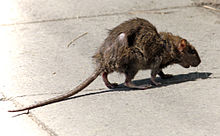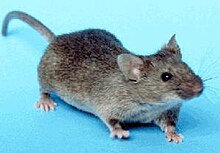rato
English
[edit]Noun
[edit]rato (countable and uncountable, plural ratos)
- Alternative form of RATO (“rocket-assisted takeoff”)
Anagrams
[edit]'Are'are
[edit]Noun
[edit]rato
References
[edit]- Kateřina Naitoro, A Sketch Grammar of 'Are'are: The Sound System and Morpho-Syntax (2013)
Catalan
[edit]Etymology 1
[edit]Pronunciation
[edit]Noun
[edit]rato m (plural ratos)
- (Castilianism) moment
- Synonym: estona
Etymology 2
[edit]Verb
[edit]rato
Esperanto
[edit]
Etymology
[edit]Probably of Romance origin.
Pronunciation
[edit]Noun
[edit]rato (accusative singular raton, plural ratoj, accusative plural ratojn)
Derived terms
[edit]Galician
[edit]Etymology
[edit]13th century. Obscure. From a family of words common to most Romance and Germanic languages; the Germanic origin of this family of words is not universally accepted.[1] Compare English rat.
Pronunciation
[edit]Noun
[edit]rato m (plural ratos)
- mouse
- (computer hardware) mouse (input device used to move a pointer on the screen)
- saury (Scomberesox saurus)
Related terms
[edit]- rata (“rat”)
References
[edit]- “rraton” in Xavier Varela Barreiro & Xavier Gómez Guinovart: Corpus Xelmírez - Corpus lingüístico da Galicia medieval. SLI / Grupo TALG / ILG, 2006–2018.
- “rato” in Dicionario de Dicionarios da lingua galega, SLI - ILGA 2006–2013.
- “rato” in Tesouro informatizado da lingua galega. Santiago: ILG.
- “rato” in Álvarez, Rosario (coord.): Tesouro do léxico patrimonial galego e portugués, Santiago de Compostela: Instituto da Lingua Galega.
- ^ Joan Coromines, José A. Pascual (1983–1991) “rata”, in Diccionario crítico etimológico castellano e hispánico (in Spanish), Madrid: Gredos
Haitian Creole
[edit]Etymology
[edit]Pronunciation
[edit]Noun
[edit]rato
References
[edit]- Targète, Jean and Urciolo, Raphael G. Haitian Creole-English dictionary (1993; →ISBN)
Ido
[edit]
Etymology
[edit]Borrowed from Esperanto rato, English rat, French rat, German Ratte, Italian ratto, Spanish rata.
Pronunciation
[edit]Noun
[edit]rato (plural rati)
Italian
[edit]Etymology
[edit]Borrowed from Latin ratus, perfect passive participle of reor (“to deem, judge”).
Pronunciation
[edit]Adjective
[edit]rato (feminine rata, masculine plural rati, feminine plural rate)
- (literary, rare) ratified, confirmed
- (canon law) valid, ratified, approved (of marriage)
- (law, rare) Synonym of stipulato
Further reading
[edit]- rato in Treccani.it – Vocabolario Treccani on line, Istituto dell'Enciclopedia Italiana
Anagrams
[edit]Latin
[edit]Adjective
[edit]ratō
References
[edit]- “rato”, in Charlton T. Lewis and Charles Short (1879) A Latin Dictionary, Oxford: Clarendon Press
- rato in Charles du Fresne du Cange’s Glossarium Mediæ et Infimæ Latinitatis (augmented edition with additions by D. P. Carpenterius, Adelungius and others, edited by Léopold Favre, 1883–1887)
- rato in Gaffiot, Félix (1934) Dictionnaire illustré latin-français, Hachette.
Old High German
[edit]Etymology
[edit]From Proto-West Germanic *ratō, from Proto-Germanic *raþô, *ruttô, *rattaz (“rat”). See German Ratte.
Noun
[edit]rato m
Descendants
[edit]Portuguese
[edit]
Pronunciation
[edit]
- Rhymes: -atu
- Hyphenation: ra‧to
Etymology 1
[edit]From Vulgar Latin rattus (“rat”), of Germanic origin. Cognate to Galician rato and Spanish ratón. Mostly displaced Old Galician-Portuguese mur. The computing term is a semantic loan from English mouse.
Alternative forms
[edit]Noun
[edit]rato m (plural ratos, feminine rata, feminine plural ratas)
- rat (any rodent of the genus Rattus)
- mouse (any rodent of the genus Mus)
- Synonym: (Brazil) camundongo
- (computer hardware, Portugal) mouse (input device used to move a pointer on the screen)
- Synonym: (Brazil) mouse
- burglar; petty thief (person who steals small objects)
Derived terms
[edit]- arroz-de-rato
- jogo de gato e rato
- ninho de rato
- orelha-de-rato
- ratão (augmentative)
- ratazinha (diminutive)
- ratinho (diminutive)
- rato almiscareiro
- rato de biblioteca
- rato-do-campo
- rato-toupeira
- rato-veadeiro
Etymology 2
[edit]From Latin raptus, compare Spanish rato.
Noun
[edit]rato m (plural ratos)
- (Trás-os-Montes) while (a very short period of time)
Etymology 3
[edit]Verb
[edit]rato
Further reading
[edit]- “rato” in Dicionário infopédia da Língua Portuguesa. Porto: Porto Editora, 2003–2024.
Spanish
[edit]Pronunciation
[edit]Etymology 1
[edit]Noun
[edit]rato m (plural ratos)
- a while, bit (a short period of time)
- 1997, Roberto Bolaño, “Henri Simon Leprince”, in Llamadas telefónicas [Last Evenings on Earth]:
- Durante tres meses, en los ratos libres que le deja el periódico y su labor clandestina escribe un poema de más de seiscientos versos en donde se sumerge en el misterio y en el martirio de los poetas menores.
- (please add an English translation of this quotation)
- time
- Pasó un buen rato viendo la película.
- He/She had a good time watching the movie.
- Me hizo pasar un mal rato.
- I had a terrible time because of him/her.
Derived terms
[edit]Etymology 2
[edit]See rata, the modern term.
Noun
[edit]rato m (plural ratos, feminine rata, feminine plural ratas)
Further reading
[edit]- “rato”, in Diccionario de la lengua española, Vigésima tercera edición, Real Academia Española, 2014
- “rato” in Lexico, Oxford University Press.
Ternate
[edit]Pronunciation
[edit]Noun
[edit]rato (Jawi راتو)
References
[edit]- Frederik Sigismund Alexander de Clercq (1890) Bijdragen tot de kennis der Residentie Ternate, E.J. Brill
- Rika Hayami-Allen (2001) A descriptive study of the language of Ternate, the northern Moluccas, Indonesia, University of Pittsburgh
- English lemmas
- English nouns
- English uncountable nouns
- English countable nouns
- 'Are'are lemmas
- 'Are'are nouns
- Catalan terms borrowed from Spanish
- Catalan terms derived from Spanish
- Catalan terms with IPA pronunciation
- Catalan lemmas
- Catalan nouns
- Catalan countable nouns
- Catalan masculine nouns
- Catalan non-lemma forms
- Catalan verb forms
- Esperanto terms derived from Proto-Indo-European
- Esperanto terms derived from the Proto-Indo-European root *reh₁d-
- Esperanto terms derived from Romance languages
- Esperanto terms with IPA pronunciation
- Esperanto terms with audio links
- Rhymes:Esperanto/ato
- Esperanto lemmas
- Esperanto nouns
- Esperanto 1894 Universala Vortaro
- Words approved by the Akademio de Esperanto
- eo:Rodents
- Galician terms with unknown etymologies
- Galician terms derived from Germanic languages
- Galician terms with IPA pronunciation
- Galician lemmas
- Galician nouns
- Galician countable nouns
- Galician masculine nouns
- gl:Computer hardware
- gl:Mammals
- gl:Rodents
- Haitian Creole terms derived from French
- Haitian Creole terms with IPA pronunciation
- Haitian Creole lemmas
- Haitian Creole nouns
- Ido terms borrowed from Esperanto
- Ido terms derived from Esperanto
- Ido terms borrowed from English
- Ido terms derived from English
- Ido terms borrowed from French
- Ido terms derived from French
- Ido terms borrowed from German
- Ido terms derived from German
- Ido terms borrowed from Italian
- Ido terms derived from Italian
- Ido terms borrowed from Spanish
- Ido terms derived from Spanish
- Ido terms with IPA pronunciation
- Rhymes:Ido/ato
- Ido lemmas
- Ido nouns
- io:Mammals
- Italian terms borrowed from Latin
- Italian terms derived from Latin
- Italian 2-syllable words
- Italian terms with IPA pronunciation
- Rhymes:Italian/ato
- Rhymes:Italian/ato/2 syllables
- Italian lemmas
- Italian adjectives
- Italian literary terms
- Italian terms with rare senses
- it:Law
- Latin non-lemma forms
- Latin adjective forms
- Old High German terms inherited from Proto-West Germanic
- Old High German terms derived from Proto-West Germanic
- Old High German terms inherited from Proto-Germanic
- Old High German terms derived from Proto-Germanic
- Old High German lemmas
- Old High German nouns
- Old High German masculine nouns
- Portuguese 2-syllable words
- Portuguese terms with IPA pronunciation
- Rhymes:Portuguese/atu
- Rhymes:Portuguese/atu/2 syllables
- Portuguese terms derived from Vulgar Latin
- Portuguese terms derived from Germanic languages
- Portuguese semantic loans from English
- Portuguese terms derived from English
- Portuguese lemmas
- Portuguese nouns
- Portuguese countable nouns
- Portuguese masculine nouns
- pt:Computer hardware
- European Portuguese
- Portuguese terms derived from Latin
- Transmontane Portuguese
- Portuguese non-lemma forms
- Portuguese verb forms
- pt:Rodents
- Spanish 2-syllable words
- Spanish terms with IPA pronunciation
- Rhymes:Spanish/ato
- Rhymes:Spanish/ato/2 syllables
- Spanish terms derived from Latin
- Spanish lemmas
- Spanish nouns
- Spanish countable nouns
- Spanish masculine nouns
- Spanish terms with quotations
- Spanish terms with usage examples
- Spanish terms derived from Vulgar Latin
- Spanish terms derived from Germanic languages
- Spanish terms derived from Proto-Germanic
- Spanish terms with archaic senses
- es:Time
- Ternate terms with IPA pronunciation
- Ternate lemmas
- Ternate nouns
